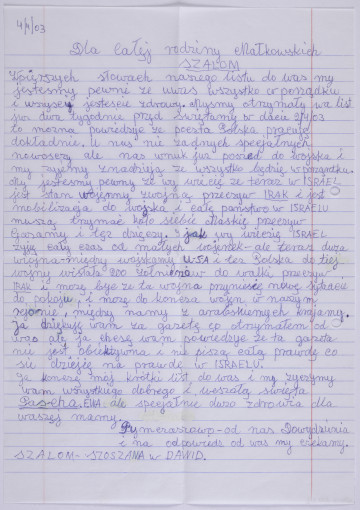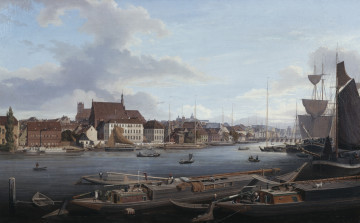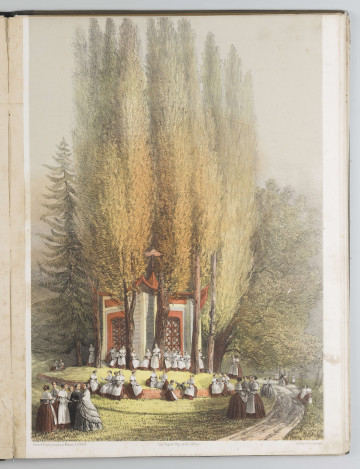
A letter
2003
Museum of the history of Polish Jews
Collection of 18 letters written by Dawid Zylbert in Israel from 1993, when he met in Poland, after almost half a century, with Mieczysław Małkowski, who helped him during the war – the meeting, as it later turned out, had taken place shortly before Małkowski’s death – to the turn of 2011 and 2012, when contact with Dawid Zylbert became impossible due to his state of health (he died in February 2021). In his correspondence with Mieczysław Małkowski and his family, Zylbert, who had returned to the Polish language after many years, shared his emotions and reflections on establishing contact with them and with Poland (at that time he received a Bronze Medal for fighting in the uprisings of 1943 and 1944, and – together with his wife – he had been granted Polish citizenship), on Mieczysław Małkowski being posthumously awarded the title of Righteous Among the Nations; he reported on the current general situation in Israel, in particular on the course of the so-called Second Intifada (‘uprising’ in Arabic; reference to the second uprising by Palestinians against the Israeli authorities, following the first one, which occurred in the late 1980s and early 1990s – see https://encyklopedia.pwn.pl/haslo/intifada;3915190.html (Accessed 17 November 2021) and the Middle East conflicts from the first decade of the 21st century (in the letters, he also described how the ongoing war directly affects his family). In 1939, the eleven-year-old Dawid Zylbert attended the public school at Maria Kazimiera Street (ul. Marii Kazimiery), which Mietek Małkowski had also attended earlier; in 1939 Mietek was 15 years old and was finishing the gymnasium of the Marian Fathers in the Warsaw’s Bielany district. They both loved playing football and supported the RKS Marymont club. Dawid lived in a wooden house with garrets at the junction of Potocka Street (ul. Potocka) and Morawska Street (ul. Morawska), where his parents ran a shop. They rented both premises from Józef and Zofia Małkowski. The Małkowski family had moved a year earlier to a new brick house on the edge of the parcel (on the corner of 4 Morawska Street [ul. Morawska 4] and 19 Barszczewska Street [ul. Barszczewska 19]). In Dawid’s home, his mother used to sing songs in Yiddish and his father used to pray in Hebrew and Aramaic. Blue-eyed Dawid spoke Polish at school and when playing outdoors. During the occupation, his fluency in Polish and his bright eyes often saved his life. In November 1940, he and his family were moved to the Warsaw Ghetto. The overwhelming hunger motivated the boy to smuggle food for his relatives who were deprived of the opportunity to earn a living. Dawid used various methods to get through the ghetto wall, usually by removing loose bricks. To earn money, he collected cigarette butts on the streets to later sell them. Sometimes the Zylberts’ customers from before the war, including the Małkowski family, would support Dawid with food. When his relatives were deported to Treblinka in 1942, Dawid never returned to the ghetto. He spent one night at the attic of the Małkowskis tenement house at 6 Potocka Street (now ul. Potocka 2a). Fearing denunciation, he spent the nights wherever he could – on a bench in the Stefan Żeromski Park, in the nooks of the ‘Blaszanka’ factory on the former Kamedułów Street (currently ul. Gwiaździsta). Finally, the brave boy came up with the idea of digging a hole in the ground on the Vistula sandbank (currently known as Kępa Potocka). When he went there in the winter, he used branches to cover his tracks in the snow. Although the surroundings were not frequented, there could always be an unexpected passer-by who would bring in unwanted visitors. Unfortunately, this hideout quickly became infested with vermin. Dirty and infested with lice, he would come to Mietek Małkowski, who let him take a bath and provided with clean underwear and clothes. He was also given a cup of warm milk, often with honey, as well as bread with fat. They usually met in the absence of the family, because Mietek’s mother, fearing for her loved ones (three sons and two grandsons), was reluctant to see the boy from the ghetto at home. Dawid Zylbert’s life became much more peaceful when Mietek passed him Aryan documents for the identity of Henryk Podolski or Henryk Polkowski. He then became more courageous and started selling cigarettes and newspapers on the Three Cross Square (plac Trzech Krzyży). The war-time contacts of Mietek and Dawid were interrupted by the outbreak of the Warsaw Uprising. The Germans set fire to the wooden house at the junction of Potocka Street (ul. Potocka) and Morawska Street (ul. Morawska). A moment earlier they had been looking for a hiding Jew. The youngest of the Małkowskis brothers, Mieczysław, drew their attention with his age and tawny complexion. Fortunately, his brother Czesław had the presence of mind to pull down Mieczysław’s pants. After determining that the young man was not circumcised, the ‘law-abiding’ occupiers left the brothers alone. Dawid Zylbert fought in the Warsaw Uprising in the structures of the People’s Army alongside Icchak Cukierman (Yitzhak Zuckerman) pseudonym ‘Antek’. After the uprising, together with the civilian population, he passed through the camp in Pruszków, from where he escaped to Włochy near Warsaw. There, unfortunately, he was denounced. The Germans transported him to the prison in Częstochowa, where he lived to see the arrival of the Red Army. Immediately after the end of the war, Dawid decided to emigrate illegally to Palestine. He fought in the First Arab-Israeli War and in subsequent conflicts. He married Shoshana, a girl born in Kalisz, who spent her childhood in Siberia. They settled in Beit She’an and had three daughters named Hanna, Ryfka and Shulamith after David’s sisters and his mother, who were murdered in Treblinka. David Zylbert, or Silbert, as his name is now often transcribed in Israel, visited Poland for the first time in July 1993 and found the house at the junction of Morawska Street (ul. Morawska) and Barszczewska Street (ul. Barszczewska), still inhabited by Mieczysław Małkowski. After the unexpected visit, the two men started writing to each other. Zylbert decided to apply to Yad Vashem, the World Holocaust Remembrance Center to honour Mieczysław Małkowski with the medal Righteous Among the Nations. This title and medal were awarded to Małkowski posthumously, in March 2000. EMB
Znaleziono 18 obiektów
19th (?) century
Castle Museum in Łańcut

1839
National Museum in Szczecin

1860
National Museum in Lublin
DISCOVER this TOPIC
Museum of King Jan III's Palace at Wilanów
DISCOVER this PATH
Educational path